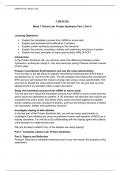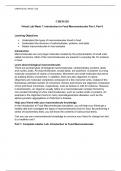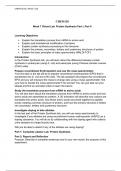Chem 120 week 7 lab - Study guides, Class notes & Summaries
Looking for the best study guides, study notes and summaries about Chem 120 week 7 lab? On this page you'll find 48 study documents about Chem 120 week 7 lab.
Page 2 out of 48 results
Sort by
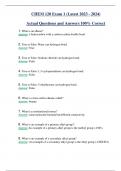
-
CHEM 120 Exams Bundle Latest 2024 - 2025 (Final Exam 1 - 5, Midterm Exam 1, 2, Exam 1, 2, Review Guide, Chem 120 Lab Final, Chem 120 Week 7 ) | A Rated Guide | Questions and Answers (Solved)
- Package deal • 13 items • 2023
-
- $30.49
- + learn more
CHEM 120 Exams Bundle Latest 2024 - 2025 (Final Exam 1 - 5, Midterm Exam 1, 2, Exam 1, 2, Review Guide, Chem 120 Lab Final, Chem 120 Week 7 ) | A Rated Guide | Questions and Answers (Solved)
CHEM 120 Week 7 Virtual Lab; Protein Synthesis Part I, Part II
CHEM 120 Week 7 Virtual Lab; Introduction to Food Macromolecules Part I, Part II.docx
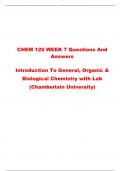
-
CHEM 120 WEEK 7 Questions And Answers Introduction To General, Organic & Biological Chemistry with Lab (Chamberlain University)
- Exam (elaborations) • 37 pages • 2023
- Available in package deal
-
- $38.99
- + learn more
CHEM 120 WEEK 7 Questions And Answers Introduction To General, Organic & Biological Chemistry with Lab (Chamberlain University)
CHEM 120 Week 7 Virtual Lab; Protein Synthesis Part I, Part II
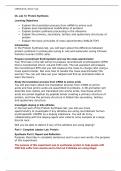
-
CHEM 120 OL Lab 13: Protein Synthesis week 7
- Other • 5 pages • 2024
-
- $20.49
- + learn more
OL Lab 13: Protein Synthesis Learning Objectives Explain the translation process from mRNA to amino acid Explain post-translational modification of proteins Explain protein synthesis processing in the ribosome Explain the primary, secondary, tertiary and quaternary structures of protein Explain the basic principles of mass spectrometry (MALDI-TOF) Introduction In the Protein Synthesis lab, you will learn about the difference between protein synthesis in prokaryote (u...
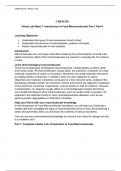
-
CHEM 120 Week 7 Virtual Lab; Introduction to Food Macromolecules Part I, Part II
- Other • 3 pages • 2023
- Available in package deal
-
- $20.99
- + learn more
Learning Objectives • Understand the types of macromolecules found in food • Understand the structure of carbohydrates, proteins, and lipids • Detect macromolecules in food samples Introduction Macromolecules are very large molecules created by the polymerization of small units called monomers. Most of the macromolecules are present in everyday life, for instance in food.
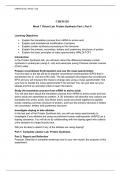
-
CHEM 120 Week 7 Virtual Lab; Protein Synthesis Part I, Part II
- Other • 3 pages • 2023
- Available in package deal
-
- $20.99
- + learn more
Learning Objectives • Explain the translation process from mRNA to amino acid • Explain post-translational modification of proteins • Explain protein synthesis processing in the ribosome • Explain the primary, secondary, tertiary and quaternary structures of protein • Explain the basic principles of mass spectrometry (MALDI-TOF) Introduction In the Protein Synthesis lab, you will learn about the difference between protein synthesis in prokaryote (using E. coli) and eukaryote (us...
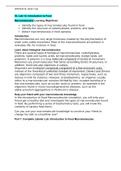
-
CHEM 120 Week 7 Lab; OL Lab 12; Introduction to Food Macromolecules
- Exam (elaborations) • 4 pages • 2021
-
- $17.49
- 2x sold
- + learn more
OL Lab 12: Introduction to Food Macromolecules Learning Objectives • Identify the types of macromolecules found in food • Identify the structure of carbohydrates, proteins, and lipids • Detect macromolecules in food samples Introduction Macromolecules are very large molecules created by the polymerization of small units called monomers. Most of the macromolecules are present in everyday life, for instance in food. Learn about biological macromolecules There are several types of biol...
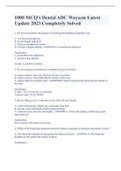
-
1000 MCQ's Dental ADC Waysem Latest Update 2023 Completely Solved
- Exam (elaborations) • 200 pages • 2023
-
- $17.99
- 1x sold
- + learn more
1. For lower premolars, the purpose of inclining the handpiece lingually is to, A. Avoid buccal pulp horn B. Avoid lingual pulp horn C. Remove unsupported enamel D. Conserve lingual dentine - ANSWER A. Avoid buccal pulp horn Explanation 1- avoid BUCCAL pulp horn 2- conserve ling. dentine So take A and B if available 2. For an amalgam restoration of a weakened cusp you should, A. reduce cusp by 2mm on a flat base for more resistance B. reduce cusp by 2mm following the outli...

$6.50 for your textbook summary multiplied by 100 fellow students... Do the math: that's a lot of money! Don't be a thief of your own wallet and start uploading yours now. Discover all about earning on Stuvia

